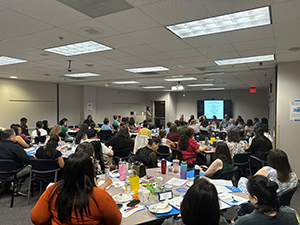
Welcome to the 2025 February issue of Volunteer Voices, a monthly newsletter for current and potential Domestic and Sexual Violence Services (DSVS) volunteers.
In this Issue:
| Table of Contents | |
|---|---|
|
|
 Hello! My name is Jennifer Perkins, and I am the supervisor of Anger and Domestic Abuse Prevention and Treatment (ADAPT), a state-certified domestic violence intervention program. We treat adults who have caused harm in their attachment relationships (past and/or present). I have been in the supervisor position for a little over a year now; however, I was previously an ADAPT counselor for 15 years.
Hello! My name is Jennifer Perkins, and I am the supervisor of Anger and Domestic Abuse Prevention and Treatment (ADAPT), a state-certified domestic violence intervention program. We treat adults who have caused harm in their attachment relationships (past and/or present). I have been in the supervisor position for a little over a year now; however, I was previously an ADAPT counselor for 15 years.
During my time as an ADAPT counselor, I had the opportunity to work alongside several volunteers. In fact, during my very first ADAPT group back in 2008, I was trained by two veteran volunteers, both of whom are now dear friends. I remember being blown away by their knowledge, professionalism, and dedication. I learned so much from them and have continued to learn a lot from many other volunteers over the years. I know ADAPT would not be what it is today if it weren’t for the many volunteers that dedicate their time and energy to this work. We cannot do our work, at the level at which we do it, without their help. I am so thankful to all our volunteers. Our clients are, too, which is frequently reflected in the end of treatment surveys they complete.
In my free time, I enjoy spending time with my loved ones, watching football, exercising, going to concerts, and working on jigsaw puzzles. I am originally from NYC, and that is my other home. I am hoping to learn how to cook someday, as well as travel more.
Jennifer Perkins, LPC
Supervisor, ADAPT
 Your definition of self-care is an act of pampering yourself. You might even have self-care on your to-do list. But if you’re like most of us, it is far down that list, behind family, friends, and work. In fact, consistently practicing self-care often feels really hard. Learn why self-care can be so challenging.
Your definition of self-care is an act of pampering yourself. You might even have self-care on your to-do list. But if you’re like most of us, it is far down that list, behind family, friends, and work. In fact, consistently practicing self-care often feels really hard. Learn why self-care can be so challenging.
 Dating violence is a pattern of harmful behaviors that can be used to exert power and control over a dating partner. This can happen in different ways, including physical violence, emotional and verbal violence, sexual violence, financial control and digital violence. Many teens experience some form of intimate partner violence even before graduating from high school.
Dating violence is a pattern of harmful behaviors that can be used to exert power and control over a dating partner. This can happen in different ways, including physical violence, emotional and verbal violence, sexual violence, financial control and digital violence. Many teens experience some form of intimate partner violence even before graduating from high school.
The purpose of Teen Dating Violence Awareness Month is to raise public awareness about the impact of dating violence on youth, educate young people about healthy relationships, and encourage the community to get involved to disrupt cycles of violence among teens.
Learn more about teen dating violence. Stay on top of teen dating violence awareness events happening in Fairfax County this year. For social media posts, go to the Teen Dating Violence Awareness Month Community Engagement Toolkit.
 In February we observe Teen Dating Violence Awareness Month and Black History Month. Check out these two videos and a blog: Let’s Talk Teen Dating Violence: Lessons Learned in Research and Evaluation, with keynote Heidi Adams Rueda presenting about community-based dating violence prevention; The Mission to Safeguard Black History in the U.S. by Julieanna L. Richardson, about documenting the past for future generations; and The Urgency of Intersectionality by Kimberle Crenshaw, explaining the overwhelming underrepresentation of violence against black women in activism, politics, and media.
In February we observe Teen Dating Violence Awareness Month and Black History Month. Check out these two videos and a blog: Let’s Talk Teen Dating Violence: Lessons Learned in Research and Evaluation, with keynote Heidi Adams Rueda presenting about community-based dating violence prevention; The Mission to Safeguard Black History in the U.S. by Julieanna L. Richardson, about documenting the past for future generations; and The Urgency of Intersectionality by Kimberle Crenshaw, explaining the overwhelming underrepresentation of violence against black women in activism, politics, and media.
 “If someone listens, or stretches out a hand, or whispers a kind word of encouragement, or attempts to understand a lonely person, extraordinary things begin to happen.”–Loretta Girzaitis
“If someone listens, or stretches out a hand, or whispers a kind word of encouragement, or attempts to understand a lonely person, extraordinary things begin to happen.”–Loretta Girzaitis
Each newsletter will include this section to help share reviews, spotlight the people who support Domestic and Sexual Violence Services, recognize birthdays and list upcoming trainings and meetings.
 PILAS Prepares Spanish-Speaking Teens and Parents
PILAS Prepares Spanish-Speaking Teens and Parents
A few years ago, Prevention, Education, and Coordination team members realized the work they do with Fairfax County teens—talking about dating violence, healthy relationships, setting boundaries, the importance of consent—was missing an entire segment of the population: Teens who speak Spanish. So, they set about the work of creating a curriculum to close this gap, and PILAS was born. Volunteer Voices recently sat down with Nora Nieto, youth prevention specialist, to talk about the program. Learn about PILAS.
 Domestic and Sexual Violence Services’ podcast, Unscripted: Conversations about Sexual and Domestic Violence, is real talk on tough topics! Stay in the know with these biweekly discussions. If you have ideas for topics you’d like to hear addressed on Unscripted, email them to DSVS’ communications specialist Kendra Lee.
Domestic and Sexual Violence Services’ podcast, Unscripted: Conversations about Sexual and Domestic Violence, is real talk on tough topics! Stay in the know with these biweekly discussions. If you have ideas for topics you’d like to hear addressed on Unscripted, email them to DSVS’ communications specialist Kendra Lee.
Angie Acosta has been with Fairfax County for nearly 10 years, spending that entire time in various roles in the Domestic and Sexual Violence Services division. She was recently promoted to supervisor of the Crisis Response Services team, and she says a typical day involves long hours and a cuppa Joe. “A day in the life of a new supervisor looks very different, but one constant is my coffee! Every morning must start with a hot cup of coffee or else I cannot function,” she says. “Generally, while I drink my coffee, I check team messages and emails for urgent matters. If nothing needs to be addressed at that time, I check the meetings I have that day and look at my to-do list to determine what I can tackle. For the most part, my day has a lot of meetings, from meeting with CRS staff or other partners we work with.”


 Reviews: Sexual Assault Survivor Stories with Dave Markel
Reviews: Sexual Assault Survivor Stories with Dave Markel Meet Karen Bilak, Hotline Volunteer
Meet Karen Bilak, Hotline Volunteer Q: How many teens did HYPE and PILAS serve in 2024?
Q: How many teens did HYPE and PILAS serve in 2024?
.png)


 Our volunteers are critical to pulling off successful workshops and trainings like this one, Sexual Violence Tier 1. Volunteers help prep training materials, setup, sign-in attendees, and break down after the event.
Our volunteers are critical to pulling off successful workshops and trainings like this one, Sexual Violence Tier 1. Volunteers help prep training materials, setup, sign-in attendees, and break down after the event.